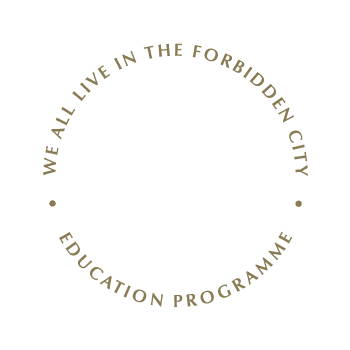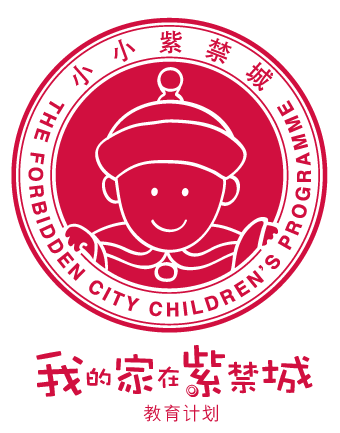

About The Forbidden City Children's Programme
The simplified Chinese edition of We All Live in the Forbidden City book series hit the shelves of bookshops across Mainland China in early 2013. Following its publication, the Education Team of the 'We All Live in the Forbidden City' Education Programme has organised a series of learning experience sessions between January and April of the same year in Beijing, where it has received encouraging support from local families and professionals in the education sector and the media. A Children' s Programme was designed and launched in 2013 by the newly formed 'The Forbidden City Children's Programme' Teaching Team in Beijing. Specially catered to young learners of the former Imperial City, the Children' s Programme worked in close collaboration with local schools to engage students as flag-bearers and ambassadors of traditional Chinese culture and instil in them a greater sense of mission and cultural identity by further leveraging the power of education, in both scope and depth.
About Our Education Partner
The Forbidden City Children's Programme represents our effort to work in active collaboration with educators and schools. The Experimental Primary School of RDFZ (formerly Zhichunli Primary School in Haidian District, Beijing) and the Primary School of Capital Normal University have become our education partners, dedicating specialised teaching rooms to the scheme and a team of teachers to its course design and teaching.
Please visit the following URLs for further information and the latest happenings at the schools.
The Experimental Primary School of RDFZ at http://www.zclxx.com (in Chinese)
The Primary School of Capital Normal University at http://www.ssdfx.net (in Chinese)
About The Programme
The Forbidden City Children' s Programme included 2 thematic workshops, "The Best Palace" and "The Strolling in the Imperial Garden". The participating students gained not only a closer familiarity with the Forbidden City through weekly sessions of interactive games, animations and small group discussions in class rooms but also a real experience with an outing to the imperial palace with the Teaching Team. The graduates then took to the stage to share their learning results with fellow students and teachers in different ways respectively.
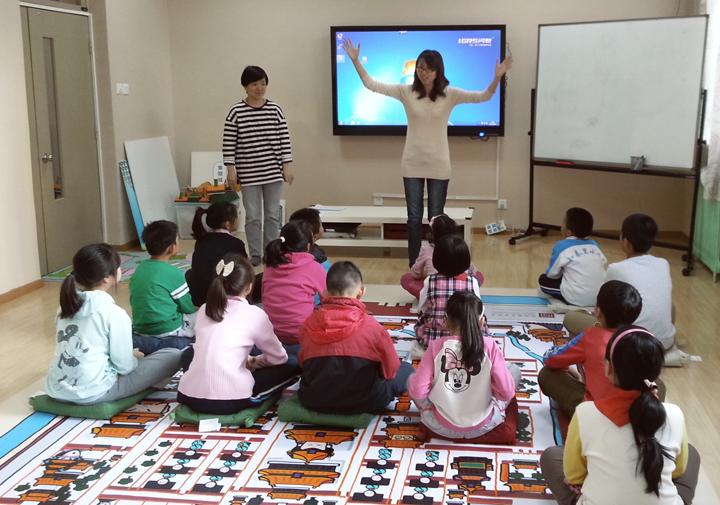 The Forbidden City Children's Programme in action!
The Forbidden City Children's Programme in action!
A Chronicle of Activities
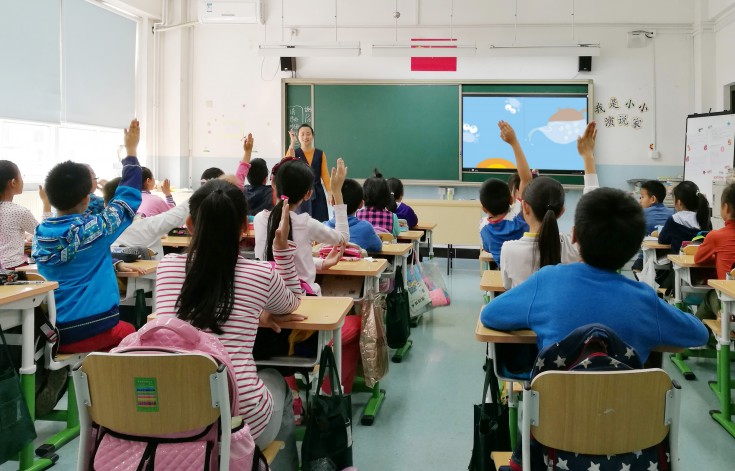
The activity design aims at enhancing the interactivity between teachers and students for boosting students’ interest in the topic of the curriculum.
Following by the first and second curriculums, “The Best Palace” and “Strolling in the Imperial Garden”, “The Forbidden City Children's Programme” in Beijing has launched a new thematic curriculum -- “1001 Chinese Objects”in the new semester this year. The curriculum aims to lead students to discover the cultural meanings especially the traditional ways of interpersonal communication behind the ancient ordinary objects: tea, chair, bowl and chopsticks. The education partner, Beijing Xinxian Hutong Elementary School, has already included it into the school-based curriculum development and officially launched the first workshop in the early October.
When it comes to Chinese beverage, tea must be one of the all-time favorites. Chinese people have discovered that tea consists of many good values from rich ingredients, long historical background to the way of feeling the nature. Therefore, the content of the curriculum also includes those topics like “growing conditions of tea”, “tea-making production”, “historical stories of tea”, etc. The curriculum also made use of different formats to gear up the learning interest of the students. Meanwhile, the session of animation especially drew attentions in class. The teacher, Ms. Gao Xiang-yu mentioned that it helped not only uplift the interest of the class but also deepen the impression to the students via a series of interesting display of tea making.
Each cup of tea also comes from the nature and man-made process. The birth of tea involves not only a lot of natural elements such as sunlight, rain, soil but also the additional process by people. Through the chapter of tea, the team hopes the students will experience the nature, discover themselves and share with others afterwards.
Following with the release of The Best Palace learning kit in Beijing in November 2015, the team has been actively working on another education kit Strolling in the Imperial Garden with the theme of Chinese garden. It’s expected to lead children from the Palace garden discovering the possibilities of the nature, the delights of craft-making and the treasurable memories.
At the beginning of 2016, the education programme has successfully invited the Beijing Xinxian Hutong Elementary School (BXHES) to be an education partner of The Forbidden City Children's Programme (FCCP). Together with the Experimental Primary School of RDFZ and the Primary School of Capital Normal University, the BXHES will participate in the development of Strolling in the Imperial Garden learning kit making the contents and designs of the kit be fitting for the needs of local teachers and students.
Supported by The Robert H. N. Ho Family Foundation (RHFF), the “Forbidden City Children's Programme” (FCCP) has been adopted in three primary schools in Beijing. On the 4th of November, Ms. Yip Tin-pui, the project manager of RHFF, has visited 2 partner schools in Beijing, Experimental Primary School of RDFZ and Primary School of Capital Normal University, observing the workshop of “the Best Palace” and the “Cultural Wall of FCCP” respectively.
Starting from the new semester, “The Forbidden City Children's Programme” (FCCP) has kicked off at the 3rd school in Beijing!
Since October, 6 teachers from the Beijing Xinxian Hutong Elementary School have started "The Best Palace" curriculum, leading 20 primary 3 students to explore the Palace and its related stories, and appreciate the blessings and inspirations evolved from the nature.
Beijing Xinxian Hutong Elementary School is one of the oldest school in the neighbourhood. The site of the school was once built a life-time temple of eunuch during Ming dynasty, and it has became a school since 1729.
With the release of “The Best Palace” learning kit, the Beijing Xinxian Hutong Elementary School and the Experimental Primary School of RDFZ have already adopted the teaching materials and the training scheme.
Starting from 2014, the Primary School of Capital Normal University has become one of the education partners of 'The Forbidden City Children's Programme' (FCCP). The whole school from principal, teachers to students, are fully supporting the programme. In order to let more students reach out to the programme contents easily, the team especially designed a display, called cultural wall of FCCP, mounted on the long corridor of the school.
The director of Design and Cultural Studies workshop Mr. Chiu Kwong-chiu led the members of CnC and tutors of FCEO to visit the school and gave thanks to the vice-principal Ms. Li Xiao-hui and teachers for their supports and devotions on the programme.
The cultural wall of FCCP depicted different contents of 'the Best Palace' workshop including 'the Most Exquisite Nature', 'Growing up Good Sentiment', and 'Little Animals at the Central Pavilion'. These contents suggested different notions such as 'the relationship between palace architecture and nature', 'the greatest wish', 'the fullest devotion', 'disturbution and cooperation' and 'the duties of imperial family members and servants' respectively. On the other side, the other 2 topics, 'Nature’s Blessing' and 'Blessings Everywhere' helped students to explore different blessing meanings hidden in traditional Chinese architecture, objects and costumes, etc.
Some teachers explained that it was the 1st time making use of such format to display teaching contents and the students did feel especially interested in. Besides displaying the content, the teachers there believed that those students who have taken the lessons of 'The Forbidden City Children's Programme' can be the tour guides for others. This arrangement could increase students' sense of achievement; on the other side, encourage students seeking more knowledge by their own. Together with the teachers of 'The Forbidden City Children's Programme', we look forward to leading more students to enjoy their studies.
At the last 2 units of 'The Forbidden City Children's Programme' in the Primary School of Capital Normal University, the teachers led a group of students to the Forbidden City for field study. The education team from Hong Kong took the chance to join in a guided tour with them.
Starting from the Meridian Gate, the students have kept searching a pair of marble pillars, called hua biao, which they have learnt from class or textbook before. On the other side, during the visit in the Imperial garden, when the students heard the legend about an old cypress being ennobled due to that it became a shading tree for the Emperor during his trip to Jiang Nan, they were highly concerned if the shading tree was with the Emperor finally. Surprisingly, those children who are in needs of care also considered if anyone would accompany the Emperor.
'What would the children still remember after the field trip to the Palace?' the team wondered. Because of that, our tutors especially designed an activity called 'Extremes of the Palace' encouraging students to recall the most impressive feeling/thing in the Palace. At the result, including hundred-year-old trees, plants with unique branches, etc., the participating students have depicted different impressions in drawing. Their teacher mentioned that they used to have the topic about old trees in art class but the students ended up finished the artworks based on reference photos. Through this event, not only did the students see the old trees in person but also deepened their understanding and feeling of tree; moreover, they felt easier to perceive the close relationship between nature and imperial architecture. By observing their artworks, we could further understand their interests and create more appropriate workshops to them in the future.
Starting from December 2014, the workshop – the Best Palace from "the Forbidden City Children's Programme" (FCCP) has launched at 3 different campuses of the Primary School of Capital Normal University respectively. Each teacher has spent over a month time on rehearsal and now is ready to share his/her interests in traditional culture to students. Take a look! A teacher dressed up like Kuai Xiang (蒯祥), a famous artisan in Ming dynasty, exploring inspirations about architecture from the nature.
"The Forbidden City Children's Programme" (FCCP) will be launched at the Primary School of Capital Normal University soon. It is the 2nd cooperating education organization in Beijing the team has worked with. There are 12 school teachers now preparing the workshops. Starting from September, with assistance of our Beijing teammates, the school teachers have been learning the teaching plans of the programme and visited the Forbidden City together in order to deepen the experience and understanding of the palace as well as our plans. The rehearsals are actively in progress and 12 teachers have also visited another local school, the Experimental Primary School of RDFZ, in which the workshops were running, for class observation.
Once the teachers are ready, catering to 120 participating grade 3 students, FCCP will take place at 3 different campuses of the Primary School of Capital Normal University.
Starting in the new semester, The Experimental Primary School of RDFZ has included the Forbidden City Children’s Programme (FCCP) in their school curriculum, and expanded the class size from a chosen few to the whole P2, totaled 168 students. Meanwhile, more teachers have taken part in the programme, together with the students they will explore the fascinating Chinese culture.
Over the past year, the Forbidden City Children' s Programme has conducted 2 series of thematic workshops “The Best Palace” and “Strolling in the Imperial Garden” at the Experimental Primary School of the High School Affiliated to Renmin University of China respectively. In the coming academic year, the entire grade of students will participate in the activities; at the same time, more teachers will take up the teaching role in the workshops. In the middle of June, school teachers, together with the education team from Hong Kong, have gone for a study tour at the Forbidden City, enriching their understanding of the programme themes and recalling their memories of the palace.
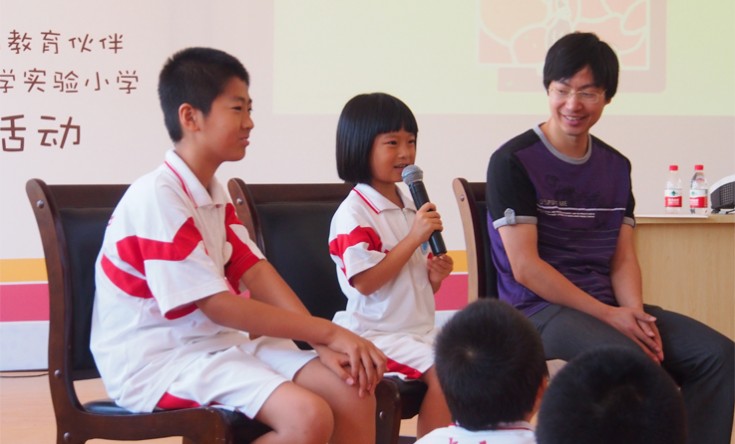
Parents and students share their views and express their wishes for the FCCP to attract wider participation from students in Beijing.
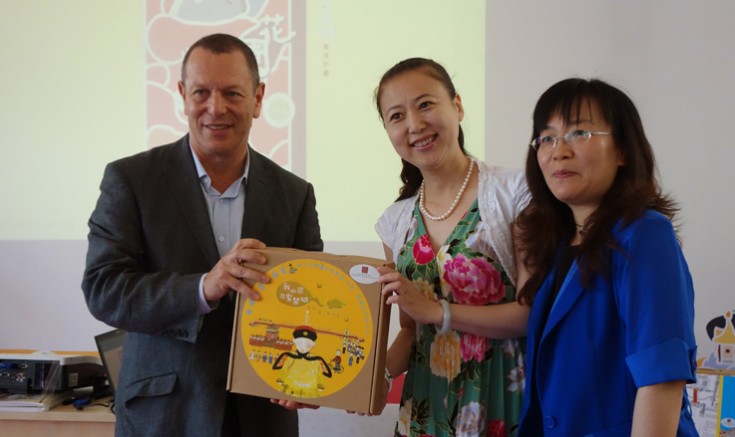
Principal Yin and Mr Lipman present the Forbidden City book series to guests in attendance.
The Forbidden City Children’s Programme (FCCP) made its appearance in the Experimental Primary School of the High School Affiliated to Renmin University of China in Beijing on 12 June 2014. Sharing its visions with educators, teachers and students in the capital city, the FCCP sought to achieve the objectives of enhancing and developing the ‘We All Live in the Forbidden City’ Education Programme’ for more students to benefit by harnessing the insights of experts present at the event. The day, packed with a rich display of programme materials, teaching methodologies and group photos, was capped off with the presentation of the We All Live in The Forbidden City book series by The Robert H. N. Ho Family Foundation. The education programme will be reaching even more students with wider impact, having earned the recognition of not only distinguished guests and parents alike but also great interest of representatives from local schools who came to observe the event.
The Beijing team of The Forbidden City Children’s Programme came away with new insight into various aspects of the education system of Hong Kong from sitting in on the sessions of Through Our Eyes Photography Education Programme and Leap! Body Movement programme organised by The Robert H. N. Ho Family Foundation, followed by a visit to Chiu Sheung School, Hong Kong on 17 January. The team also learned from their Hong Kong counterparts the similarities and differences in teaching pedagogies and learning styles of the two places.
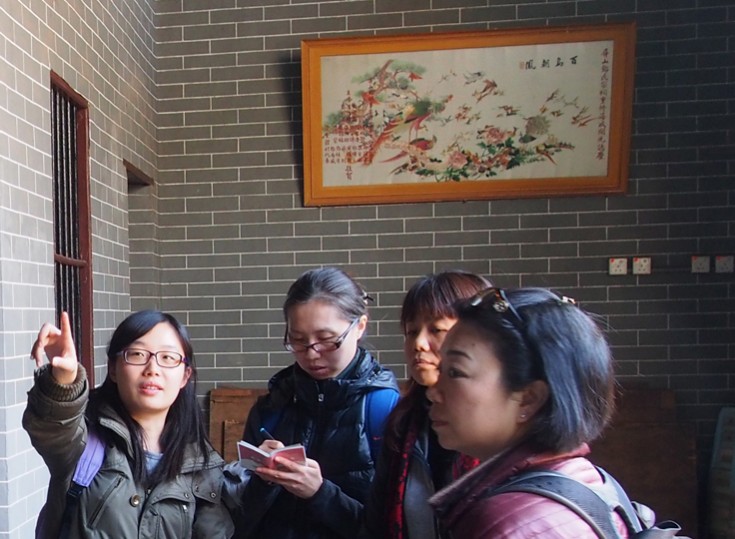
Ling, one of our tutors, explains the auspicious motifs engraved on the lintels and brackets inside the Tang Ancestral Hall.
In search of inspiration for the Beijing edition of the ‘Strolling in the Imperial Garden’ thematic workshop, on 13 January, the host team took their Beijing counterpart on a visit to the Kowloon Walled City Park and Nan Lian Garden, both paying homage to the philosophy and principles of traditional Chinese gardens.
On 9 October 2013, students in Beijing came face-to-face with The Forbidden City Children's Programme! Perked up in their seats inside a classroom designated for The Forbidden City Children's Programme, a group of over a dozen students from the Experimental Primary School joined their tutors in embarking on a two-month ‘Exploration Journey to an Imperial Palace’, navigating the palatial complex from the entrance point of ‘The Palace is Like a Big Jungle’.
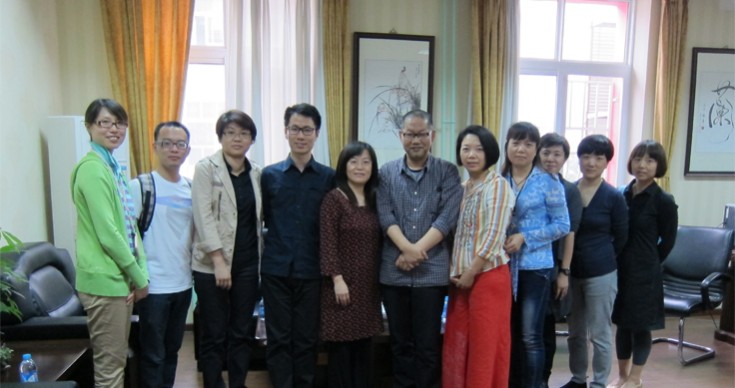
The masterminds behind the project: Chiu Kwong-chiu, director of Design & Cultural Studies Workshop, joins principal Yin Jun and teachers of the Experimental Primary School.
Our Education Team, after conducting the debut learning experience workshop series last season, returned to Beijing where they joined hands with the Experimental Primary School of the High School Affiliated to Renmin University of China (formerly Zhichunli Primary School) to launch the ‘Little Forbidden City’ series. Adopting an approach that takes its lead from the palatial structure, this latest project uses stories to inspire children of Beijing to explore the fascinating wonders the royal residence has to offer. The project will be officially introduced in October to primary students in the second, fourth and fifth forms of the school.

